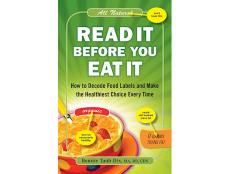Talking To The Experts: Child Nutrition Guru Melissa Halas-Liang
In the back-to-school spirit, we’re talking to kid-focused nutrition expert and creator of the nutrition-promoting animated "Super Crew®" Melissa Halas-Liang. She gets down and dirty about childhood obesity, the Child Nutrition Bill and common misconceptions parents have about feeding their kids.
My passion is to help moms make more nutritious choices because, ultimately, good nutritional choices will provide their kids with a much healthier life. Surprisingly, a child’s eating habits and food preferences are fairly established by age six. The toddler-to-kindergarten age group is the most impressionable, yet starting as early as age one, kids are introduced to an excess of packaged, processed foods that are usually very unhealthy. Unfortunately, foods trying to pass as healthy natural foods, such as cheese crackers or pretzels (made mostly with unhealthy refined white flour)...“fruit” chews (loaded with corn syrup), and fruit roll-ups that may not even contain real fruit tend to dominate kids’ diets. I have found packing fresh fruit for my toddler to be a much healthier option, which she loved!
Super Kids Nutrition stemmed from an innate desire to provide a reliable source that will help educate parents and teachers about healthy food options for their children. From that developed the Super Crew® characters,who get their powers from whole foods. The Super Crew® was a way I could draw kids towards whole foods and healthier foods in general and away from packaged processed foods. Overall, I want to get the message out that kids can and will eat right if it’s presented in a way that makes them want it!
Busy parents are looking for fun, easy and practical tips on what to feed their family. We provide this and more on our Web site with topics such as parent role modeling, picky eaters, pregnancy, kids weight concerns, snack ideas, and fitness -- pretty much what you need to know to grow healthy kids. All of our information comes from Registered Dietitians and nutrition experts –so it’s reliable and reviewed by our team of experts.
There are also specific activities that parents can use at home or teachers can use in the classroom:
- Parents can influence their kids to make healthier choices by visiting the Super Crew® kids site with their child, printing out the coloring sheets (which are great for water-colors) and using this as an opportunity to expose kids to new whole foods to try.
- There are also learning activities with the Super Crew® that offer positive nutrition and health images while teaching concepts like trying new foods, a food’s health benefit, or teaching math, language, science or logic through nutrition concepts.
- Additionally, there is a list of children’s book reviews with nutrition and health themes for young kids, in the “read to you children” section. These books help plant a seed for healthy living and are an effective method to create positive changes.
Childhood obesity usually comes down to offering unhealthy food choices too often, allowing too many outside influences and not providing enough exercise into your child’s life.
- Make healthier choices more often. This boils down to choosing more foods that are grown from the earth and that are less processed and choosing leaner animal foods from animals raised without antibiotics. I tell parents to open their pantries, refrigerator and freezer and give their family’s diet an honest look. Model the right food choices by stocking, shopping and offering healthy foods in their home.
- Be aware of outside influences. Children are influenced by commercials, what their friends are eating, what’s served in schools, restaurants’ kids menus and extended family. Parents need to be aware of what is being fed to their children while they are outside their own homes.
- Get moving more. Kids need 60 minutes of physical activity each day to experience healthy growth, muscle development and, most importantly, brain development! Most of their daily physical activity should be moderate-intensity aerobic activity like walking fast, but kids also need bone and muscle strength building exercises in their weekly activities. Because families are so busy today, it is important that the entire family makes getting physical activity together a priority so that everyone can meet their needs.
- Limit TV time. A simple step like limiting TV and video games to less than 2 hours a day can help create time for more fitness. Also, there is overwhelming evidence that demonstrates that kids who have a TV in their room are at a higher risk of becoming obese as adults.
It’s great to see our country’s leaders recognizing that the health of our children is critical for our future and making policy change happen now. Food insecurity (not knowing when and where your next meal is coming from) is still a significant problem for many of our children. This bill will help make it easier for children in need to get their next meal at school. The next aim of the bill will help reduce childhood obesity and improve children’s diets. Under the bill there will also be programs that make it easier for schools to buy more local foods, including dollars for farm-to-school programs–this is important because it helps decrease environmental impact which is also linked to our kids’ health.
It is difficult to recognize the immediate health effects of nutrition, so it’s easy to miss the harm that some foods could be causing.
- Thinking foods high in sugar are okay every day. Sugar is in so many of the foods we eat and excess calories add up quickly when sweet treats are offered daily. Some wholesome alternatives include homemade 100 percent juice pops, baked apples with cinnamon or even yogurt parfaits. These can count as a sweet treat for the day. Talking positively about food can also achieve balance, for example you can tell your child, “Choosing the fruit salad over the cookies today will help you have more energy so you’ll feel good at dance class and can study for your test.”
- Thinking it’s okay to force or bribe kids to eat their veggies. Doing this actually makes these foods less desirable. Also, rewarding good behaviors with sweet treats is linked to being overweight later in life. Instead, reward your child with a hug, verbal praise or time spent together doing one of their favorite activities.
- Feeding kids separately. Kids should always eat when you’re eating. Sometimes children aren’t hungry, but there’s no need to worry if they don’t lick their plates clean. Children are able to listen to their hunger signs and will make up for it at another meal. It’s okay, they won’t go hungry.
- Thinking kids won’t overeat. Even preschool age kids will overeat foods that are high in sugar and salt, which make up many of Americans’ food choices. It’s important to offer the right age appropriate portion size for all foods, but especially indulgent foods.
- Get involved. Know what you’re school is serving by checking out the cafeteria and joining the fundraising committee to encourage healthy fund raising initiatives. Ask about your daycare, childcare, preschool or kindergarten’s snack rotation. Are the snacks full of refined flour, artificial food coloring, trans fats and added sugar? Take a peak in the snack pantry. These foods do not fuel brain power or create healthier kids.
- If you pack, pack your child’s lunch safely. Read up on lunchbag food safety to keep them healthy.
- Choose less processed foods and more all natural ones. Instead of reaching for a pre-packed snack, grab something that’s naturally packaged, like a banana or plum.
Melissa Halas-Liang, MA RD CDE is a registered dietitian saving the world one healthy food at a time®. She is founder of www.superkidsnutrition.com, blogger and author. Her nutrition and health learning activities are widely available for free in schools through the US. Her main goal in childhood nutrition is to entertain children while creating an interest in healthy eating. She also teaches online courses in functional foods, public nutrition and wellness at several universities.

































